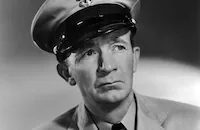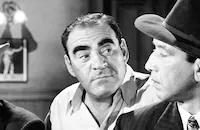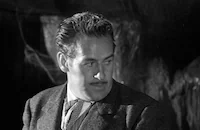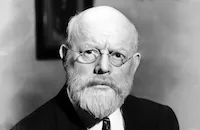Singing Guns
Brief Synopsis
Cast & Crew
R. G. Springsteen
Vaughn Monroe
Ella Raines
Walter Brennan
Ward Bond
Jeff Corey
Film Details
Technical Specs

Synopsis
Somewhere on Hangman's Mountain, near the Western town of Goldville, authorities believe that wanted outlaw Rhiannon has stashed a million dollars worth of stolen gold. While out on patrol one day, Goldville sheriff Jim Caradac sees Rhiannon hold up a stagecoach carrying Jim's sweetheart, Nan Morgan. Jim attempts to stop the robbery, but Rhiannon quickly disarms him. When he opens the strong box and finds only sand inside, Rhiannon flies into a rage and takes Jim hostage. After he hijacks the stage and drives to Goldville, Rhiannon forces Jim to walk down the middle of the street dressed in a pair of women's underwear. Rhiannon then shoots Jim and escapes, but returns later when his conscience starts to bother him. Although Jim lies motionless, Rhiannon draws his gun and approaches cautiously. When Jim suddenly reaches for his own gun, Rhiannon shoots him again. Now certain of Jim's need for medical attention, Rhiannon takes him to the nearest physician, Dr. Jonathan Mark. In the examining room, Rhiannon tells the doctor that his name is "John Gwyn" and that he found Jim by chance while he was riding. When the doctor says that Jim will need a blood transfusion, Rhiannon volunteers to be the donor. The doctor inserts the needle into Rhiannon's arm, delivering a sedative which renders him unconscious. Upon waking up hours later, Rhiannon discovers his gun is missing, and the doctor explains that he drugged him to prevent him from changing his mind about the transfusion. A judge then enters the room to deputize Rhiannon, and he agrees to take up Jim's duties until he can return to work. The next day, Rhiannon receives his first call from Nan, who asks for help ejecting a drunken man from her saloon. By Sunday morning, the jail is packed with drunks, so Rhiannon releases them and makes each one promise to attend church. When the Great Western Mine catches on fire and several miners are trapped inside, Rhiannon risks his own life to save them. Later, Nan recognizes Rhiannon as the outlaw who attacked her stagecoach and decides to report it to Jim, who has since recovered. After Rhiannon is arrested, Jim warns him that he will be charged with stagecoach robbery unless he reveals the location of his hideout, but Rhiannon refuses to talk. Later, Nan helps Rhiannon escape from jail, and by pretending to be romantically interested in him, convinces him to take her to his hideout where he has hidden the stolen gold. After Nan pistol whips Rhiannon, Jim arrives, and while he guards Rhiannon, she leaves to deliver the gold. When she is late returning, Jim begins to suspect that she has taken the gold for herself, but she soon arrives with a receipt from the governor and is reunited with her beloved Jim.

Director
R. G. Springsteen
Cast
Vaughn Monroe

Ella Raines

Walter Brennan

Ward Bond

Jeff Corey
Barry Kelley
Harry Shannon
Tom Fadden

Ralph Dunn
Rex Lease
George Chandler

Billy Gray
Mary Bear
Jimmie Dodd
Wallace Scott
Mary Eleanor Donahue

John Doucette

Roy Barcroft
Hal Price
John Gelert
Stanley Blystone
Edward Cassidy
Frank O'connor

Howard Mitchell
Douglas Hughes
Monte Montague
Denver Pyle
Crew
Fred Glickman
Peggy Gray
Hy Heath
Kenneth Holmes
Don Keyes
Herb Kirkpatrick
Johnny Lange
Reggie Lanning
Lee Lukather
Howard Lydecker
Theodore Lydecker
Abe Lyman
Bob Mark
Nels Mathias
John Mccarthy Jr.
Dorrell Mcgowan
Stuart Mcgowan
George Milo
Wilton Moore
Adele Palmer
Nathan Scott
Sunny Skylar
James Sullivan
Sid Swaney Jr.
Melville Tucker
Richard E. Tyler
Richard L. Van Enger
Al Vann
Howard Wilson
Dorothy Yutzi

Film Details
Technical Specs

Award Nominations
Best Song
Quotes
Trivia
Notes
This film opened with an offscreen narration. The film marked the first starring role in a motion picture for popular orchestra leader and singer Vaughn Monroe. The song "Mule Train," which Monroe sings in the film, was one of the biggest hits of 1949. Motion Picture Herald lists the film's release date as February 28, 1950, but other sources indicate that the film was released on March 15, 1950. Johnny Lange, Fred Glickman and Hy Heath's song "Mule Train" received an Academy Award nomination.












